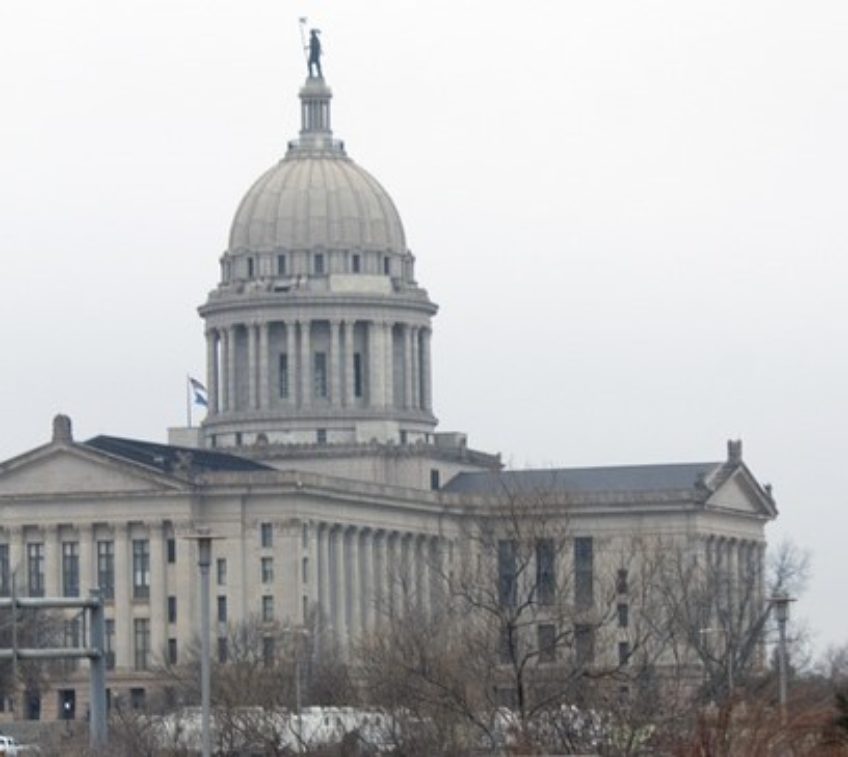State of the State: Oklahoma
While we can’t control the price of oil, we can control our budget.
Traffic cops, like governors, often have a thankless job. In her state of the state address, Oklahoma Governor Mary Fallin accepted both roles.
As a state dependent on oil and gas revenues, Oklahoma is looking to adapt and overcome the present state of energy markets. Fallin noted “a 70 percent drop in oil prices in less than two years, which has a tremendous impact on [Oklahoma’s revenue],” but added that the state can “use [its] budget crisis to create new opportunities to build a solid foundation for Oklahoma.”
Uniquely among governors so far, Fallin introduced a series of visual aids for the benefit of the legislature she addressed. Laid out on a spreadsheet were three tracks, red, yellow and green, intended to evoke traffic lights. The red track showed what happens when Oklahoma “[takes] no action” regarding the way revenues are apportioned and collected in the state, which Fallin argued would necessitate a 13.5 percent appropriation cut for FY 2017. The yellow track reflected the necessary cuts in spending after tapping into the state’s Rainy Day Fund, which even then would necessitate 10 percent cuts to state agencies.
It was at this point that Fallin proposed the green track, saying “It makes necessary cuts that will require continued efficiencies from agencies, prioritizes spending and lessens those reductions in our core service areas wherever possible.” Fallin mentioned that her budget raises some taxes, proposes no one-time expenditures (such as bonding or raiding the Rainy Day Fund) and calls for spending cuts of six percent to most agencies.
“I told you we’re [going to] have some tough talk today,” Fallin said.
The talk was as specific as it was tough. Fallin proposed capturing $910 million in recurring revenues to help appropriators fund services and, presumably, close the budget gap partially caused by the drop in oil prices. Some of that total comes from reallocation of priorities and process reforms, but some also comes from a proposed $181.6 billion increase in taxes on cigarette consumption.
While it is important for Fallin and Oklahoma to make both sides of the balance sheet match, cigarette taxes are not the way to do it. The ALEC Principles of Taxation describe the elements of sound tax policy, including economic neutrality, equity and fairness, competitiveness and reliability. Cigarette taxes, which are targeted at one specific product, are neither economically neutral nor fair. A common justification for increasing cigarette taxes Fallin has long been a proponent of improving the health of Oklahomans, which of certainly admirable, but cigarette taxes’ ability to improve public health is questionable.
Dave Bond, CEO of OCPA Impact, an Oklahoma-based advocacy group, offered a measured response to Fallin’s proposed review of products exempted from sales taxes, and linked the issue to education spending:
Gov. Fallin made clear she believes forcing Oklahomans to pay the highest sales tax burden in the U.S., as proposed by Univ. of Oklahoma President David Boren, would be a bad move for our state. If nothing is done to raise teacher salaries this legislative session, the Boren tax increase has a much higher chance of passing on the ballot in November. This would be devastating at a time when the energy downturn has already cost Oklahoma families thousands of jobs. We’re optimistic a plan can pass this session to raise teacher salaries without any tax increases, and we’re working daily to help lawmakers achieve that objective.
While not a highlight of her address, Fallin gave it against the backdrop of her record defending Oklahomans from attempts to walk back reductions in the personal income tax rate. Fallin “stood firm on preserving the latest reduction of Oklahoma’s ‘penalty on work,’ our burdensome state income tax,” said Bond. “Too many of Oklahoma’s best and brightest have left the state through the years, usually for states that don’t discourage them from earning a living. Any reduction of Oklahoma’s income tax rate is a step in the right direction.”
“For the first time, Governor Fallin has stated her public support for education savings accounts, which would be a lifeline for parents in Oklahoma whose school-age children have fallen through the cracks,” said Bond. “These parents are desperate for more options for their children. Supporters of expanding parental education choice in Oklahoma are energized by Governor Fallin’s stand.”
Two-thirds of Oklahoma fourth-graders are not proficient in reading and three-quarters are not proficient in math, according to the 2014 results of the National Assessment of Educational Progress (NAEP), so innovation and flexibility are sorely needed in the state.
Although the proposed ESAs are cutting-edge, Oklahoma would not be striking into unknown territory. Arizona has had an ESA program in place since 2011, and four other states – Florida, Mississippi, Tennessee, and Nevada – have followed in the Grand Canyon State’s footsteps. And the program is popular among Oklahomans; a recent poll found that a strong majority of likely voters in the state support ESAs.
Governor Fallin has traditionally been an ally of limited government, free markets and federalism. However, given the difficult economic circumstances that her oil-dependent state is suffering, the governor and legislature are in a trying position. Even when simply attempting to make the best of a touch economic slate, there are better ways to solve budget shortfalls than enacting or increasing taxes. That said, her continued support of education savings accounts is admirable and should not be overlooked.
This is an entry in the ALEC Center for State Fiscal Reform series, “State of the States 2016,” which will perform analysis of tax and budget issues raised in every state of the state address delivered by America’s governors. Check back frequently over the coming weeks to see the results for your state.

